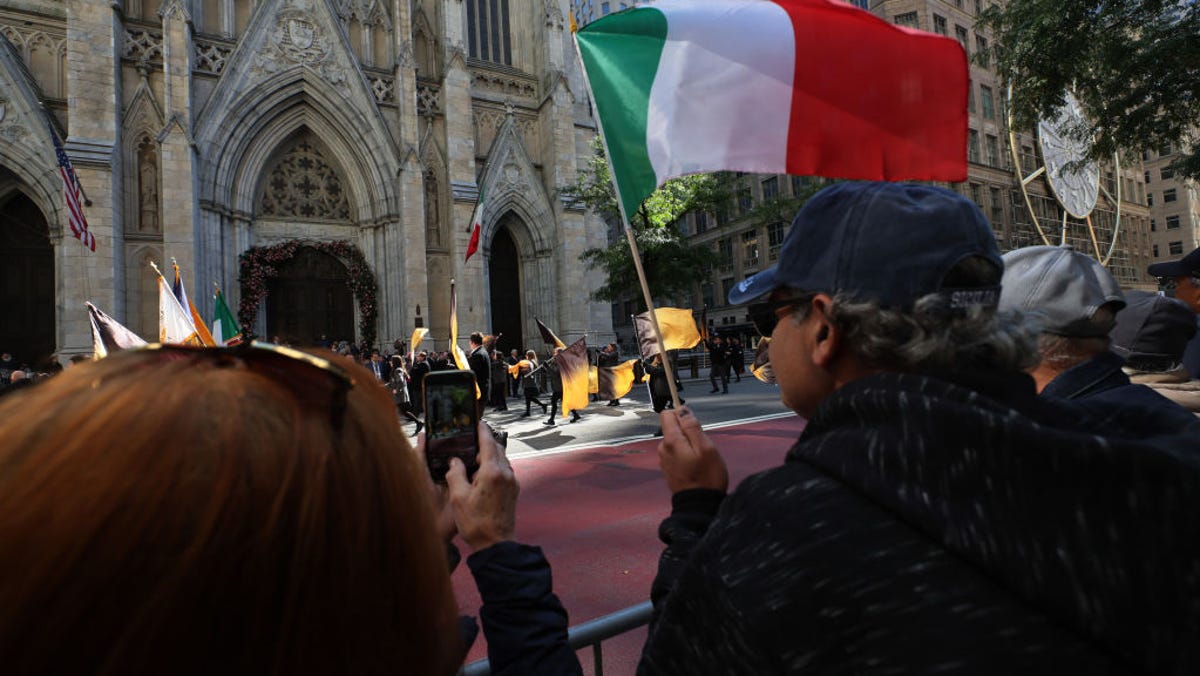Trump announces he is ‘bringing back’ Columbus Day
US President Donald Trump announced he is “bringing Columbus Day back from the ashes,” claiming Democrats tried to destroy Christopher Columbus’s legacy and that of Italian Americans.
unbranded – Newsworthy
Columbus Day is months away, but it’s on the mind of President Donald Trump, who shared a post April 27 on his social media website, Truth Social, saying he would be bringing the holiday “back from the ashes.”
It’s not the first time he’s taken up the cause.
“Sadly, in recent years, radical activists have sought to undermine Christopher Columbus’s legacy,” Trump said in a 2020 proclamation about Columbus Day. “These extremists seek to replace discussion of his vast contributions with talk of failings, his discoveries with atrocities, and his achievements with transgressions.”
His latest comments appear to be targeted at recent efforts across the country to celebrate the date as Indigenous Peoples Day, either in lieu of or in tandem with Columbus Day. Some states and cities have chosen to reframe their celebration of the federal holiday amid concerns that honoring Italian explorer Christopher Columbus glorifies the exploitation and genocide of Native Americans.
In the wake of Trump’s plans to champion Columbus Day in 2025, here’s a look a what the holiday is, when it’s celebrated and why some states have moved to change it.
What is Columbus Day?
Columbus Day commemorates explorer Christopher Columbus’ arrival in the Americas on Oct. 12, 1492. Columbus is commonly known as the man who “discovered America,” but people like Leif Eriksson are believed to have explored the continent beforehand, and various Native American tribes had lived there for centuries.
Italian Americans celebrated the day informally for years before President Franklin D. Roosevelt and Congress made it into a federal holiday, largely because of lobbying done by the Knights of Columbus, a Catholic fraternal and charitable organization.
There’s been a push to replace Columbus Day with Indigenous Peoples Day or Native Americans Day as activists and historians call for a reassessment of Columbus and his impact on indigenous people.
Some people argue the holiday celebrates Italian heritage. Others have said the day glorifies the exploitation and the genocide of native peoples.
In many Spanish-speaking South American countries, the day is called Día de la Raza (“Day of the Race” or “Day of the People,” according to Britannica) and celebrates the Indigenous peoples and cultures of Latin America.
When is Columbus Day?
When it was originally declared a federal holiday in 1937, Columbus Day was celebrated on Oct. 12. The date changed to the second Monday in October in 1971.
In 2025, Columbus Day falls on Monday, Oct. 13.
Is Columbus Day a federal holiday?
Yes, Columbus Day is a federal holiday, meaning banks, federal government offices and many workplaces will be closed. Even before 1937, when it became a federal holiday via presidential proclamation, the day was unofficially celebrated in cities with large Italian American populations.
Was the name of Columbus Day changed?
In 1990, South Dakota became the first state to declare the second Monday in October as a legal holiday known as Native Americans’ Day in “remembrance of the great Native American leaders who contributed so much to the history of our state.” The measure passed the state’s Legislature unanimously.
Several states and cities have since adopted the holiday, but others have not. About 29 states do not celebrate Columbus Day, and approximately 216 cities have either renamed or replaced the holiday with Indigenous Peoples Day, according to renamecolumbusday.org.
The government recognizes it as one of 11 paid holidays for federal workers. The U.S. Office of Personnel Management identifies the holiday as Columbus Day on its list of federal holidays, and does not make mention of Indigenous Peoples Day.
Is Trump bringing Columbus Day back?
Trump has said he is bringing Columbus Day “back,” but it never formally left. While some states and cities have chosen to acknowledge the second Monday in October as Indigenous Peoples’ Day or Native Americans’ Day (sometimes along with Columbus Day), the holiday was never formally renamed on a federal level, nor did it ever stop being a federal holiday.
However, the president said on Truth Social that “Christopher is going to make a major comeback,” writing, “I am hereby reinstating Columbus Day under the same rules, dates, and locations, as it has had for all of the many decades before!”
Trump has railed against what he described as an effort by Democrats to “destroy” Columbus’ reputation, saying his political rivals “tore down his Statues, and put up nothing but ‘WOKE,’ or even worse, nothing at all!”
In a pair of 2021 proclamations, President Joe Biden became the first to recognize Indigenous Peoples’ Day along with Columbus Day, saying the U.S. acknowledges “the painful history of wrongs and atrocities that many European explorers inflicted on Tribal Nations and Indigenous communities.”
“It is a measure of our greatness as a Nation that we do not seek to bury these shameful episodes of our past − that we face them honestly, we bring them to the light, and we do all we can to address them,” the proclamation said.
Biden also said the day should be one of reflection on the “courage and contributions of Italian Americans throughout the generations.”
Contributing: Zac Anderson, Fernando Cervantes Jr., USA TODAY; Cheryl McCloud, USA TODAY Network
